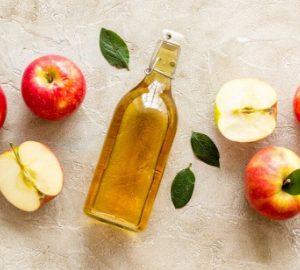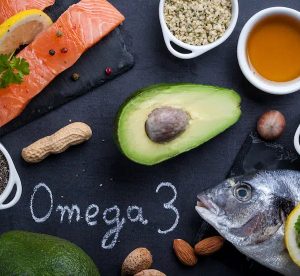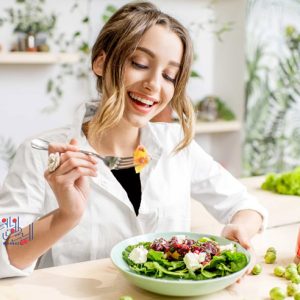All five senses (sight, hearing, touch, smell and taste) are important for communicating with the world around us. However, research shows that the general public considers the sense of sight to be the most valued, and this is easy to understand. For sighted people, most of our first impressions and how we perceive our surroundings are partially thanks to our eyes. Vision also plays an essential role in learning, and it is estimated that 80% of learning occurs through visual pathways.
Nutrition and eye health
Considering the importance of eyes, taking care of them is of the highest importance. If you’ve always scored perfect on eye exams, you may ignore your 20/20 vision or assume you’ll always have perfect eyes. Your genetics play an important role in eye health, but research shows that age is the most common factor in common eye diseases. While you can’t slow time down, you can accept modifiable risk factors by making small lifestyle changes.
Some of the best ways to keep your eyes healthy include scheduling regular eye exams, wearing sunglasses, and eating healthy foods that are good for your eyes. It’s true, what’s on your plate can affect your vision.
People may not realize it, but the foods you eat can affect your eye health as well as your overall health. Having a balanced diet can help fight eye problems and diseases such as age-related macular degeneration, cataracts, and dry eyes. Some nutrients are specifically targeted to support eye health.
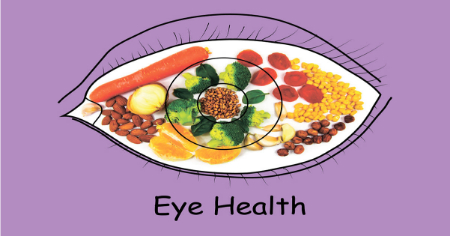
Important nutrients for eye health
Almost all essential nutrients benefit your health in some way, but some do more for your eyes and vision. You should make an effort to eat a variety of nutrient-dense foods, but if you want to know which ones are best for your eyesight, keep reading. Both the American Optometric Association (AOA) and the American Academy of Ophthalmology (AAO) recommend the following key nutrients to support eye health:
• Lutein and zeaxanthin: antioxidants found mainly in dark leafy vegetables that can reduce the risk of cataracts and other chronic eye diseases.
• Vitamin C: An antioxidant found in many fruits (and vegetables!) that can slow the progression of age-related macular degeneration and loss of visual acuity.
• Vitamin E: an antioxidant found in vegetable oils, nuts and vegetables such as sweet potatoes that protects healthy eye tissue from free radical damage.
• Zinc: An essential mineral found in seafood and nuts that can protect against poor vision and cataracts.
• Omega-3 Fatty Acids: Essential fatty acids also found in fatty fish, nuts and seeds, and are essential for eye health as well as supporting the development of vision and tear glands.
Antioxidants are key
What do these nutrients have in common? Except for omega-3, all of them are antioxidants or have antioxidant properties, and according to nutritionists we spoke with, antioxidants are the best nutrients for eye health.
Eyes are sensitive to oxidative stress. Oxidative stress can cause eye diseases, so antioxidants can help protect eye health and reduce the risk of diseases like glaucoma and diabetic retinopathy.
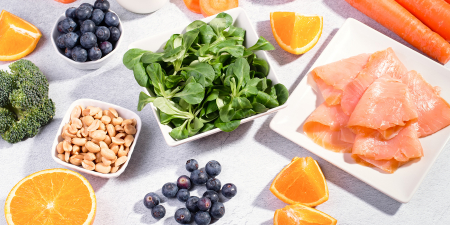
Great foods for eye health
Salmon
Commonly associated with brain health, salmon consumption is also vital for eye health due to its omega-3 fatty acids, docosahexaenoic acid (DHA) and eicosapentaenoic acid (EPA). Fatty fish are rich in DHA and EPA, which have been shown to be beneficial for eye health in early fetal life. During fetal development and in the first days of life, the eyes are enriched with omega-3 fatty acids, especially DHA. Pregnant mothers can help their baby’s eye health by eating salmon during pregnancy.
While the benefits of DHA and EPA in salmon to the eye begin before birth, their importance continues throughout life. In people with diabetes, two servings per week of fatty fish such as salmon, tuna, mackerel, and sardines have been shown to reduce the risk of retinal damage from diabetic retinopathy.
Salmon is one of the richest food sources of DHA, it is also a source of vitamin A and zinc. There are few foods that have the combination of nutrients that are good for the eyes.
Broccoli
The health benefits of broccoli are numerous, including its ability to protect eye health. For starters, broccoli is rich in vitamin C, an antioxidant that research has shown reduces oxidative stress in the eye and helps prevent cataracts. One cup of raw broccoli contains 81.2 milligrams of vitamin C, which is roughly 90 percent of the daily requirement for men and more than 100 percent for women. Broccoli is also a good source of vitamin A. According to a review, its antioxidant load may help prevent age-related macular degeneration.
Broccoli’s antioxidant content is nothing new, but a lesser-known nutrient called sulforaphane may also boost its eye benefits. Sulforaphane affects some disease processes and has been shown to have a positive effect on disease progression in common eye disorders such as glaucoma.
Sweet potatoes
Carrot has long been known as the best food for eye health. That’s because carrots are rich in beta-carotene, the pigment that gives vegetables their orange color. Carrots are certainly high in beta-carotene, but sweet potatoes actually contain more of this beneficial pigment. A serving of cooked carrots provides 8.3 milligrams of beta-carotene, and the same serving of cooked sweet potatoes contains 11.5 milligrams of this nutrient.
Beta-carotene is beneficial because the body converts it into vitamin A, which is essential for good vision. The beta-carotene in sweet potatoes helps adjust the eyes in low light. To get the most beta-carotene and vitamin C from sweet potatoes, it is recommended to boil them with the skin on.
walnut
Walnuts are excellent foods for eye and vision health due to their nutrients such as vitamin E, zinc and omega-3 fatty acids. They specifically contain alpha-linolenic acid (ALA), the plant form of omega-3. ALA is then converted into DHA and EPA by the body, so walnuts are a good source of omegas for vegetarians and vegans who do not eat fatty fish.
Research suggests that the ALA in walnuts may be especially beneficial for people with diabetes-related eye problems. ALA can help improve dry eye and retinopathy in diabetics. High blood sugar can negatively affect the blood vessels in the eye, so fiber-rich foods that help stabilize blood sugar can further improve eye health in people with diabetes.
In addition to these nutrients, vitamin E is an antioxidant commonly found in healthy fats. Vitamin E and other polyphenols in walnuts help reduce inflammation and protect against free radical damage. Walnuts also provide zinc, a mineral that is highly concentrated in the retina.
Yolk
Eggs, one of the favorite foods for breakfast, may be a good choice to strengthen your eyes. Egg yolks are a highly bioavailable source of a carotenoid called lutein. Lutein has been shown to reduce age-related macular disease
A study found that moderate consumption of eggs significantly reduces the risk of age-related macular disease. As one of the most important nutrients for eye health, the benefits of lutein do not end there. Lutein and zeaxanthin, another carotenoid found in eggs, can improve macular hypopigmentation in older people. This is one of the risk factors for age-related macular degeneration, which causes gradual and sometimes complete loss of vision over time. Mortiarti cites an older study showing a link between egg consumption and increased macular pigmentation in older adults.
Egg yolks are also a source of other eye-healthy nutrients such as zinc and vitamin A.
Cabbage
Kale is one of the best foods for eye health, along with other dark leafy vegetables such as kale, collard greens, and spinach. The National Eye Institute suggests that kale is even better for your eyes than carrots.
Kale is especially strong in the antioxidants lutein and zeaxanthin, so it can help reduce sun damage to eye tissue and reduce the risk of age-related eye problems. We recommend lutein-rich leafy greens like kale. These carotenoids can help reduce the risk of eye diseases that lead to irreversible blindness.
Saffron
Saffron is a bright red herb obtained from the saffron flower. Harvesting is labor-intensive and expensive because each flower only produces a few strands of saffron, but if you can get it, it’s one of the best foods for eye health. Saffron plays several roles in protecting eye health. It has been shown to reduce intraocular pressure in glaucoma, protect the retina in people with high blood pressure, and improve vision in people with early-stage macular degeneration.
Obviously, saffron contains compounds with antioxidant properties that may help explain many of its benefits for the eyes. There are many studies that support the therapeutic abilities of saffron to help treat eye diseases such as age-related macular degeneration and glaucoma.
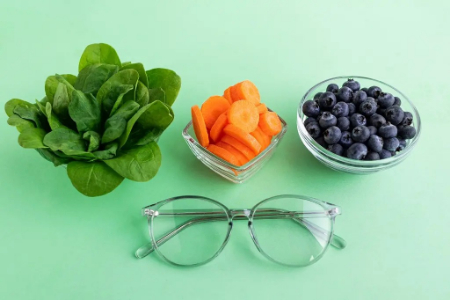
Frequently asked questions about food to improve eyesight
1. What foods are useful for strengthening eyesight?
Green leafy vegetables, fatty fish, nuts and seeds, fruits and eggs
2. What habits can help improve vision?
Regular eye examination, use of sunglasses, adequate rest, adequate water intake, proper lighting
3. When should you see an ophthalmologist?
– If you notice any changes in your vision, such as blurred vision, diplopia, or floating spots, you should see an eye doctor.
– If you have a family history of eye diseases such as AMD or cataracts, you should see an eye doctor regularly.
– If you suffer from eye pain, eye redness, or eye itching, you should see an eye doctor.
4. Can nutritional supplements help to improve vision?
Certain dietary supplements such as lutein, zeaxanthin, and vitamin A may help improve vision. However, you should consult your doctor before taking any dietary supplement.
5. Can surgery help to improve vision?
Surgery can be used to treat some eye problems, such as cataracts and age-related macular degeneration (AMD). However, surgery has risks and side effects and should be performed by an experienced eye surgeon.
6. Is there a way to prevent eye aging?
As we age, our eyesight naturally decreases. However, eye aging and age-related eye problems can be prevented by following healthy habits such as regular eye exams, wearing sunglasses, and eating healthy foods.
the final conclusion
Finally, no single food will give you super vision, a balanced diet, rich in a variety of plant foods, proteins and healthy fats, is the best diet for eye health. Diets high in fruits and vegetables, fatty fish, nuts, and legumes are said to reduce the risk of eye disease later in life.
